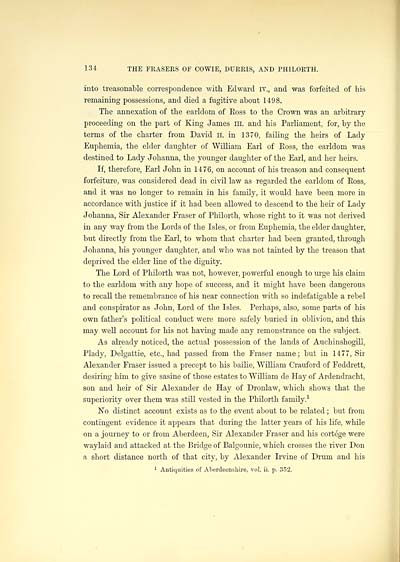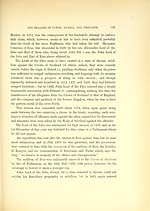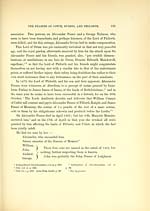Frasers of Philorth > Volume 1
(168)
Download files
Complete book:
Individual page:
Thumbnail gallery: Grid view | List view

134 THE FRASERS OF COWIE, DURRIS, AND PHILORTH.
into treasonable correspondence with Edward iv., and was forfeited of his
remaining possessions, and died a fugitive about 1498.
The annexation of the earldom of Eoss to the Crown was an arbitrary
proceeding on the part of King James in. and his Parliament, for, by the
terms of the charter from David n. in 1370, failing the heirs of Lady
Euphemia, the elder daughter of William Earl of Eoss, the earldom was
destined to Lady Johanna, the younger daughter of the Earl, and her heirs.
If, therefore, Earl John in 1476, on account of his treason and consequent
forfeiture, was considered dead in civil law as regarded the earldom of Eoss,
and it was no longer to remain in his family, it would have been more in
accordance with justice if it had been allowed to descend to the heir of Lady
Johanna, Sir Alexander Fraser of Philorth, whose right to it was not derived
in any way from the Lords of the Isles, or from Euphemia, the elder daughter,
but directly from the Earl, to whom that charter had been granted, through
Johanna, his younger daughter, and who was not tainted by the treason that
deprived the elder line of the dignity.
The Lord of Philorth was not, however, powerful enough to urge his claim
to the earldom with any hope of success, and it might have been dangerous
to recall the remembrance of his near connection with so indefatigable a rebel
and conspirator as John, Lord of the Isles. Perhaps, also, some parts of his
own father's political conduct were more safely buried in oblivion, and this
may well account for his not having made any remonstrance on the subject.
As already noticed, the actual possession of the lands of Auchinshogill,
Plady, Delgattie, etc., had passed from the Fraser name; but in 1477, Sir
Alexander Fraser issued a precept to his bailie, William Crauford of Feddrett,
desiring him to give sasine of those estates to William de Hay of Ardendracht,
son and heir of Sir Alexander de Hay of Dronlaw, which shows that the
superiority over them was still vested in the Philorth family. 1
No distinct account exists as to the event about to be related ; but from
contingent evidence it appears that during the latter years of his life, while
on a journey to or from Aberdeen, Sir Alexander Fraser and his cortege were
waylaid and attacked at the Bridge of Balgounie, which crosses the river Don
a short distance north of that city, by Alexander Irvine of Drum and his
1 Antiquities of Aberdeenshire, vol. ii. p. 352.
into treasonable correspondence with Edward iv., and was forfeited of his
remaining possessions, and died a fugitive about 1498.
The annexation of the earldom of Eoss to the Crown was an arbitrary
proceeding on the part of King James in. and his Parliament, for, by the
terms of the charter from David n. in 1370, failing the heirs of Lady
Euphemia, the elder daughter of William Earl of Eoss, the earldom was
destined to Lady Johanna, the younger daughter of the Earl, and her heirs.
If, therefore, Earl John in 1476, on account of his treason and consequent
forfeiture, was considered dead in civil law as regarded the earldom of Eoss,
and it was no longer to remain in his family, it would have been more in
accordance with justice if it had been allowed to descend to the heir of Lady
Johanna, Sir Alexander Fraser of Philorth, whose right to it was not derived
in any way from the Lords of the Isles, or from Euphemia, the elder daughter,
but directly from the Earl, to whom that charter had been granted, through
Johanna, his younger daughter, and who was not tainted by the treason that
deprived the elder line of the dignity.
The Lord of Philorth was not, however, powerful enough to urge his claim
to the earldom with any hope of success, and it might have been dangerous
to recall the remembrance of his near connection with so indefatigable a rebel
and conspirator as John, Lord of the Isles. Perhaps, also, some parts of his
own father's political conduct were more safely buried in oblivion, and this
may well account for his not having made any remonstrance on the subject.
As already noticed, the actual possession of the lands of Auchinshogill,
Plady, Delgattie, etc., had passed from the Fraser name; but in 1477, Sir
Alexander Fraser issued a precept to his bailie, William Crauford of Feddrett,
desiring him to give sasine of those estates to William de Hay of Ardendracht,
son and heir of Sir Alexander de Hay of Dronlaw, which shows that the
superiority over them was still vested in the Philorth family. 1
No distinct account exists as to the event about to be related ; but from
contingent evidence it appears that during the latter years of his life, while
on a journey to or from Aberdeen, Sir Alexander Fraser and his cortege were
waylaid and attacked at the Bridge of Balgounie, which crosses the river Don
a short distance north of that city, by Alexander Irvine of Drum and his
1 Antiquities of Aberdeenshire, vol. ii. p. 352.
Set display mode to:
![]() Universal Viewer |
Universal Viewer | ![]() Mirador |
Large image | Transcription
Mirador |
Large image | Transcription
Images and transcriptions on this page, including medium image downloads, may be used under the Creative Commons Attribution 4.0 International Licence unless otherwise stated. ![]()
| Histories of Scottish families > Frasers of Philorth > Volume 1 > (168) |
|---|
| Permanent URL | https://digital.nls.uk/96567516 |
|---|
| Attribution and copyright: |
|
|---|
| Description | A selection of almost 400 printed items relating to the history of Scottish families, mostly dating from the 19th and early 20th centuries. Includes memoirs, genealogies and clan histories, with a few produced by emigrant families. The earliest family history goes back to AD 916. |
|---|

